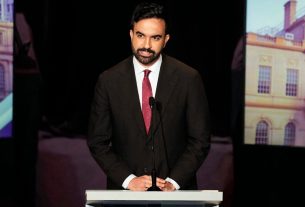((JEWISH REVIEW)) — When a large Zionist Orthodox group gathered virtually on Monday to pray for Israel, the group’s executive chairman, Doron Perez, wasn’t there — one of his sons had been wounded in battle, and another was missing in action.
“Thank God, their son Yonatan has returned home,” Rabbi Danny Mirvis, the deputy CEO of World Mizrachi, an umbrella body for Zionist Orthodox organizations, said at the beginning of the gathering, in a mix of Hebrew and English. “Yonatan was shot in the leg whilst engaged in heroic military activity. Thank God, he’s OK.”
But, Mirvis continued, “We are desperately, desperately waiting to hear from their son Daniel. Based on unconfirmed reports — and I stress this is currently unofficial and unconfirmed — but it seems like, in most likelihood, he is missing in action. We have not heard from him since Shabbat morning and there are increasing concerns about his whereabouts and wellbeing.”
Before the group began reciting psalms for the welfare of Israel, Mirvis read aloud the two men’s Hebrew names.
The moment was a stark illustration of how the invasion of southern Israel, and its staggering toll of killed, wounded and captured Israelis, has rippled throughout the Jewish world. The event that it kicked off included the chief rabbis of a number of countries.
“We are united in prayer, in love, in support and solidarity for Am Yisrael and Medinat Israel,” Mirvis said, using Hebrew terms for the people of Israel and the state of Israel. Continuing in the mix of the two languages characteristic of traditionally observant Jewish gatherings, he added, “There are so many individuals, so many families who need our moral support and our prayers at this time, it’s just too many to absorb and to truly digest.”
The live stream was one of the first large-scale events organized by Orthodox Jews in the Diaspora since the invasion on Saturday. The Jewish holiday of Simchat Torah, during which Orthodox Jews abstain from using electricity, ended Saturday night in Israel and on Sunday night in Diaspora countries. Because they were off their phones and computers, many Orthodox Jews only learned of the true scale of the events — hundreds murdered, thousands injured, 100 taken captive — as they emerged from the holiday.
Monday’s event was one of many across the Orthodox world that aimed to cope with a day of historic Jewish tragedy. The Jerusalem branch of the Satmar Hasidic movement, which traditionally rejects Zionism, issued a declaration marking Monday as a “day of prayer” that would include liturgy generally associated with the High Holidays — including the “Avinu Malkeinu” prayer and the recitation of God’s 13 attributes of mercy. The declaration called to “awaken the abundant mercies of the heavens.”
The World Mizrachi program, following Mirvis’ remarks, began in Hebrew with Israel’s Ashkenazi Chief Rabbi, David Lau, who recited Psalm 120, which begins with God telling King David, “Sit at my right hand until I make your enemies a footstool for your feet.”
Lau followed that with Psalm 20, which begins, “May the Lord answer you in time of trouble, the name of Jacob’s God keep you safe. May He send you help from the sanctuary, and sustain you from Zion”
A mix of readings and pleas for divine relief informed much of the session. There were readings from the chief rabbis of Britain, South Africa, the Conference of European Rabbis and the CEO of the Orthodox Union. Rabbi Dovid Fendel, who leads a yeshiva that mixes religious study and military training in Sderot, an embattled city on the border of the Gaza Strip, called for the reoccupation and resettlement of Gaza, 18 years after Israel withdrew its troops and settlements from the territory.
Also featured in the event was a scroll bearing the names and photos of those known to be killed, accompanied by a recording of “El Malei Rachamim,” a traditional prayer for the dead.



